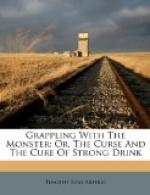So it went on, from bad to worse, under the Colonial Government, until 1787, when the State constitution was adopted. To what a frightful magnitude the evil of drunkenness, provided for and fostered by license, had grown, appears from an entry in the diary of John Adams, under date of February 29th, 1760, in which he says that few things were “so fruitful of destructive evils” as “licensed houses.” They had become, he declares, “the eternal haunts of loose, disorderly people of the town, which renders them offensive and unfit for the entertainment of any traveler of the least delicacy.” * * * “Young people are tempted to waste their time and money, and to acquire habits of intemperance and idleness, that we often see reduce many to beggary and vice, and lead some of them, at least, to prison and the gallows.”
In entering upon her career as a State, Massachusetts continued the license system, laying upon it many prudent restrictions, all of which were of no avail, for the testimony is complete as to the steady increase of drunkenness, crime and debauchery.
TESTIMONY OF JOHN ADAMS.
Writing to Mr. Rush, in 1811, John Adams says: “Fifty-three years ago I was fired with a zeal, amounting to enthusiasm, against ardent spirits, the multiplication of taverns, retailers, dram-shops and tippling-houses. Grieved to the heart to see the number of idlers, thieves, sots and consumptive patients made for the physicians in these infamous seminaries, I applied to the Court of Sessions, procured a Committee of Inspection and Inquiry, reduced the number of licensed houses, etc., but I only acquired the reputation of a hypocrite and an ambitious demagogue by it. The number of licensed houses was soon reinstated; drams, grog and sotting were not diminished, and remain to this day as deplorable as ever.”
OPENING A WIDER DOOR.
In 1816, so demoralized had the sentiment of the people become, and so strong the liquor interest of the State, that the saving provision in the license laws, which limited the sale of liquor to inns and taverns, was repealed, and licenses were granted to common victualers, “who shall not be required to furnish accommodations” for travelers; and also to confectioners on the same terms as to inn-keepers; that is, to sell and to be drunk on the premises. This change in the license laws of Massachusetts was declared, by Judge Aldrich, in 1867, to be “one of the most fruitful sources of crime and vice that ever existed in this Commonwealth.”
Up to as late as 1832, attempts were continued to patch up and amend the license laws of the State; after that they were left, for a time, to do their evil work, all efforts to make them anything but promoters of drunkenness, crime and poverty being regarded as fruitless.




